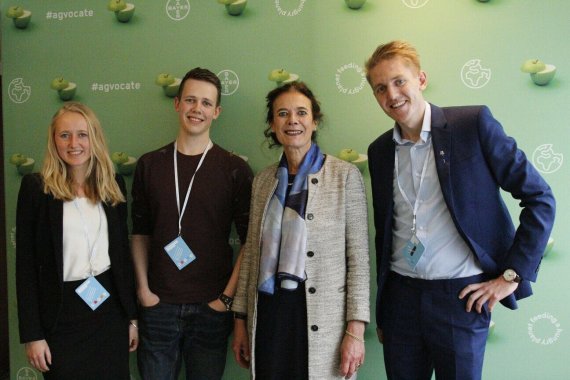Left to right: Florine Kremer, Patrick van der Hart, Louise Fresco and Niels Veneman. © Bayer
They don’t have much time. ‘We should have a moment around six thirty’, Florine Kremer messages on Thursday afternoon. She follows a free master and is at the Youth Ag-Summit this week. There are lectures every morning, and during the afternoons, they work in project groups on their solutions to feed the world in the future.
How did you get to be here?
‘A fellow student asked whether I wanted to participate. The food issue is often discussed in Wageningen, and it touched me. I’m mostly interested in ways to help consumers make sustainable choices. There are various ways to do that, from meat taxes to raising awareness. The essay I wrote on the subject was selected. Out of the thirty Dutch submissions, six were selected.’
How do you like the conference?
‘It’s really great to see so many people with passion. Everyone really works hard and contributes. The speakers are very good and I met people from many different countries. I heard a lot of news on CRISPR/Cas and precision agriculture. I sometimes feel a bit like an outlier, because I’m not very familiar with these subjects as a consumer scientist. I had never been on a farm before this conference.’
The conference was organised by the multinational Bayer. Was that noticeable?
‘It certainly was, as there were also many speakers from Bayer. It is hard for me to say whether their stories were in any way partial. Their lectures were mostly about the technical solutions that I know very little about. The lecture by that was held by WUR President of the Executive Board Louise Fresco much better fitted my field of expertise. That was a sound lecture.’
What does your group work on?
‘Our solution is an app that analyses bank statements for environmental impact. That way, your purchases tell you how large your ecological footprint is. We visualise how many planets would be necessary for everyone to lead the same lifestyle as you do. That way, the app clearly shows what the consequences of your choices are. I think that the technical solutions that were discussed during many of the lectures are very important, but a behavioural change might be more important still.’
We also shortly speak on the phone with the other two Wageningen students, Patrick van der Hart and Niels Veneman. Niels is working on a knowledge base for climate-adaptive agriculture. He really enjoys the conference. ‘But it often comes down to maximising the production. As a forest and nature manager, I tend to lean towards sustainability.’ Patrick also expresses being deeply impressed with the conference. He speaks of Facebook groups where knowledge is shared and of the importance of interaction.
The three have to go back to the auditorium. Tonight, they will be told whether their ideas are awarded any prizes. At 3:43 on Friday, an email is sent: Patrick’s group has come in second! Their idea will receive 5,000 euros to further develop their idea. Today, they will travel back home.

